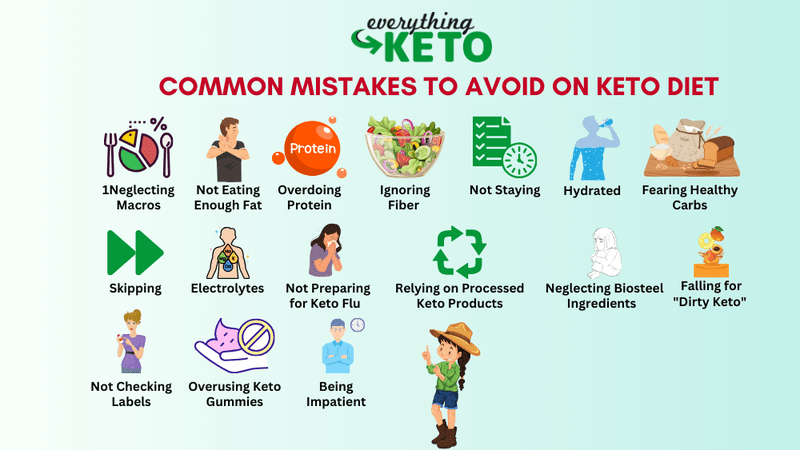
What do you think are the biggest challenges when starting a low-carb diet? Making any lifestyle change can be daunting, and trying to cut down on carbohydrates can feel even trickier. It’s easy to trip up and make common missteps along the way that can hinder your progress. Knowing these mistakes upfront can help you navigate your low-carb journey more successfully.
Understanding Low-Carb Diets
Low-carb diets focus on reducing your intake of carbohydrates, which are typically found in sugary foods, pasta, and bread. When you decrease carbs, your body starts to burn fat for energy instead of sugar. This shift can lead to effective weight loss and enhanced energy levels if done correctly. However, many people inadvertently sabotage their efforts.
Mistake #1: Skipping Meals
One of the most significant errors you can make is skipping meals in the hopes of cutting down on carbs. This may create an inconsistent eating pattern that can leave you feeling fatigued and more inclined to grab something unhealthy later. Regular meals help to manage hunger and provide your body with a steady energy source.
Tip to Avoid This Mistake
Instead of skipping meals, focus on smaller, balanced meals that contain healthy fats and proteins. Foods like chicken, fish, and avocados can keep you satisfied while still aligning with your low-carb goals.
Mistake #2: Overlooking Hidden Carbs
When you think of carbs, you might visualize bread and pasta; however, hidden carbs lurk in many places—sauces, dressings, and even some vegetables. It’s easy to underestimate how much you’re actually consuming. For instance, a seemingly harmless salad dressing might carry a higher sugar content than you expect.
Tip to Avoid This Mistake
Make it a habit to read nutrition labels. Familiarize yourself with the carb counts of the foods you consume frequently. You can also opt for homemade dressings and sauces with low carb ingredients like olive oil and vinegar. Knowing where hidden carbs hide can greatly aid your low-carb success.
Focusing on Unsuitable “Low-Carb” Foods
The food industry has gotten quite crafty in labeling products as “low-carb” or “diet-friendly.” It’s tempting to stock up on these items, believing they’ll support your diet. However, many of these foods are processed and lack essential nutrients.
Tip to Avoid This Mistake
Prioritize whole foods. Aim for fresh meats, vegetables, nuts, and healthy fats. Cooking your meals at home allows you to control the ingredients and ensures that you’re eating food that retains nutrient value.

Get Your Guide To Low-carb Success
Relying Too Heavily on Processed Low-Carb Products
While it’s convenient to indulge in low-carb snacks and treats, relying too much on processed products can backfire. These items often contain artificial ingredients and can lack the nutritional balance needed for a healthy diet.
Awareness is Key
Be cautious about consuming too many processed low-carb foods. It is essential to balance these with whole, nutrient-dense foods. Incorporating a variety of natural foods will help to ensure that your diet remains healthy and satisfying.
Neglecting Hydration
Another common mistake is overlooking hydration. When adjusting to a low-carb diet, your body may release excess water, leading you to believe you don’t need much water intake. Proper hydration is essential for overall health and can also help combat cravings.
Tip to Avoid This Mistake
Make water your go-to beverage. Aim for at least eight glasses a day, and consider adding slices of lemon or cucumber for flavor. Herbal teas can be another excellent option if you want some variety while maintaining hydration.

Not Tracking Food Intake
If you’re not tracking what you’re eating, it’s easy to underestimate your carb intake. Keeping a food diary can help you stay accountable and reveal any unconscious eating habits that may be preventing you from reaching your goals.
How to Track Your Intake
You don’t have to be fanatical about it, but a simple app can make a big difference in understanding your food choices. You’ll gain insights into how certain foods affect your mood and energy levels, making it easier to adjust your diet according to your needs.
Mistake #3: Setting Unrealistic Expectations
Expecting to lose weight quickly often leads to disappointment. Sustainable weight loss takes time, and feeling discouraged can sometimes drive you back to old eating habits. It’s essential to have a realistic outlook on your progress.
Embrace the Journey
Instead of focusing solely on the scale, celebrate small victories. Whether it’s feeling less bloated, having more energy, or fitting into clothing more comfortably, these are all positive signs of progress.
Ignoring Portion Control
Even low-carb foods can contribute to weight gain if consumed in large portions. It’s essential to be mindful of how much you’re eating, regardless of the type of food. This can be especially true for nuts and healthy fats, which are often calorie-dense.
Tip to Avoid This Mistake
Use smaller plates or bowls to help control portion sizes. Paying attention to serving sizes can prevent overeating and help you maintain a balance in your diet.

Inadequate Fiber Intake
Low-carb diets can sometimes lead to inadequate fiber consumption, especially if you’re cutting out many fruits and whole grains. Fiber is essential for digestive health and helps keep you feeling fuller longer.
Focus on Healthy Fiber Sources
Incorporate low-carb, high-fiber foods like leafy greens, chia seeds, and flaxseeds. These can help maintain gut health while keeping you satiated.
Not Preparing Meals Ahead of Time
When life gets busy, it’s easy to reach for quick, unhealthy options instead of sticking to your low-carb plan. Not preparing meals in advance can lead to difficult choices when hunger strikes.
How to Stay on Track
Set aside a couple of hours during the week to meal prep. Cooking proteins, chopping veggies, and creating snacks in advance can save you time and keep you on track with your goals, even on the busiest days.

Inconsistent Exercise Routine
While diet plays a significant role in weight management, a consistent exercise routine is also crucial. Many people neglect this aspect while focusing solely on their eating habits. Exercise helps boost your metabolism and supports overall well-being.
Make It Part of Your Lifestyle
Find physical activities you enjoy, whether that’s walking, cycling, or dance. Make movement a regular part of your routine, and remember that integrating physical activity naturally into your day-to-day life is just as beneficial as hitting the gym.
Mistake #4: Ignoring The Importance of Fat
A common misconception about low-carb diets is that fat is the enemy. In reality, when you decrease carbohydrates, you should increase healthy fats to replace those calories. Failing to do so can lead to fatigue and cravings.
Embrace Healthy Fats
Foods such as avocados, olive oil, and nuts are excellent sources of healthy fats. These can help you feel full, provide energy, and fulfill your body’s nutritional needs.
Comparing Yourself to Others
In the age of social media, it’s easy to fall into the trap of comparing your progress to others. Everyone’s body responds differently to dietary changes, and obsessively comparing your journey to someone else’s can lead to frustration.
Focus on Your Personal Journey
Remember that your path is your own. Concentrate on your unique goals, progress, and health. Engaging with supportive communities can provide encouragement without the negative comparison.
Neglecting Meal Variety
Eating the same meals repeatedly can lead to boredom and eventual derailment from your diet. Meal variety is important to keep you mentally engaged and ensure you’re getting a full range of nutrients.
Keep It Interesting
Try to introduce new recipes or ingredients each week. Experimenting with different low-carb meals can make things exciting and pleasurable. You might even discover new favorites along the way!
Not Seeking Support
Making dietary changes can feel isolating, especially if those around you aren’t on the same path. Trying to go at it alone can lead to unaccountability and slip-ups.
Find Your Support System
Reach out to friends, family, or local groups who share similar health goals. Having people to connect with and share challenges and victories can motivate you and make your journey more enjoyable.
Misunderstanding Macronutrient Ratios
Successfully following a low-carb diet often requires an understanding of macronutrients: carbohydrates, fats, and proteins. Many miscalculate these ratios, leading them to eat too many carbs while not getting adequate fats or proteins.
Calculate Your Macronutrient Goals
You can use various tools or consult with a nutritionist to help you understand your ideal macronutrient breakdown. Balancing all three nutrients can make your low-carb diet more satisfying and effective.
Becoming Too Rigid
In the pursuit of a low-carb lifestyle, a common mistake is turning too rigid. Being too strict can make your diet feel like a punishment rather than a healthier lifestyle choice.
Allow Room for Flexibility
Incorporating treats occasionally can have a positive impact on your mental state. Remember that it’s perfectly acceptable to indulge in moderation. This flexibility can prevent feelings of deprivation and help you maintain a positive relationship with food.
Mistake #5: Not Listening to Your Body
Everyone’s body reacts differently to dietary changes. Ignoring your hunger cues or energy levels can lead to negative consequences, including feeling tired or experiencing cravings.
Tune Into Your Body’s Signals
Pay attention to how foods make you feel. If a specific low-carb food leaves you feeling drained or hungry shortly after, it may not be the right choice for you. Learning to listen to your body can help you make better dietary decisions.
Conclusion
Starting and maintaining a low-carb diet can present challenges, but being aware of common pitfalls can make a significant difference in your success. Remember, it’s a journey that requires patience and understanding. With careful planning, flexibility, and a focus on whole, nutritious foods, you can create a sustainable low-carb lifestyle that feels rewarding and enjoyable.
As you navigate your low-carb adventure, celebrate your progress, both big and small, and know that every step counts towards a healthier you. Embrace the journey and remember that it’s about finding balance and nurturing a positive relationship with food.
